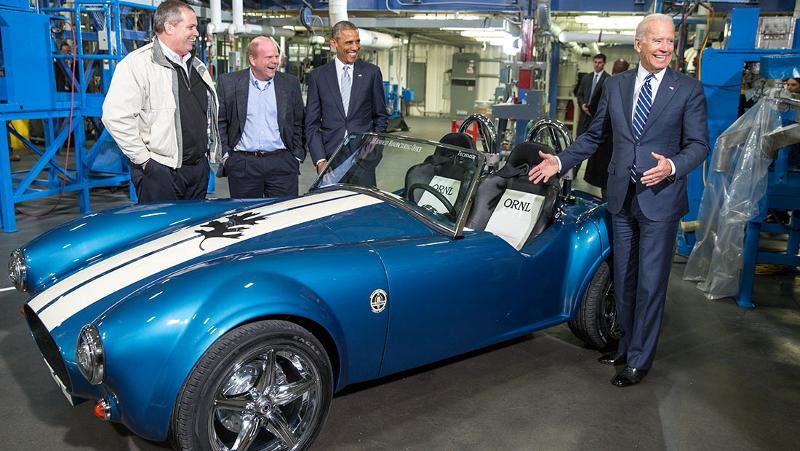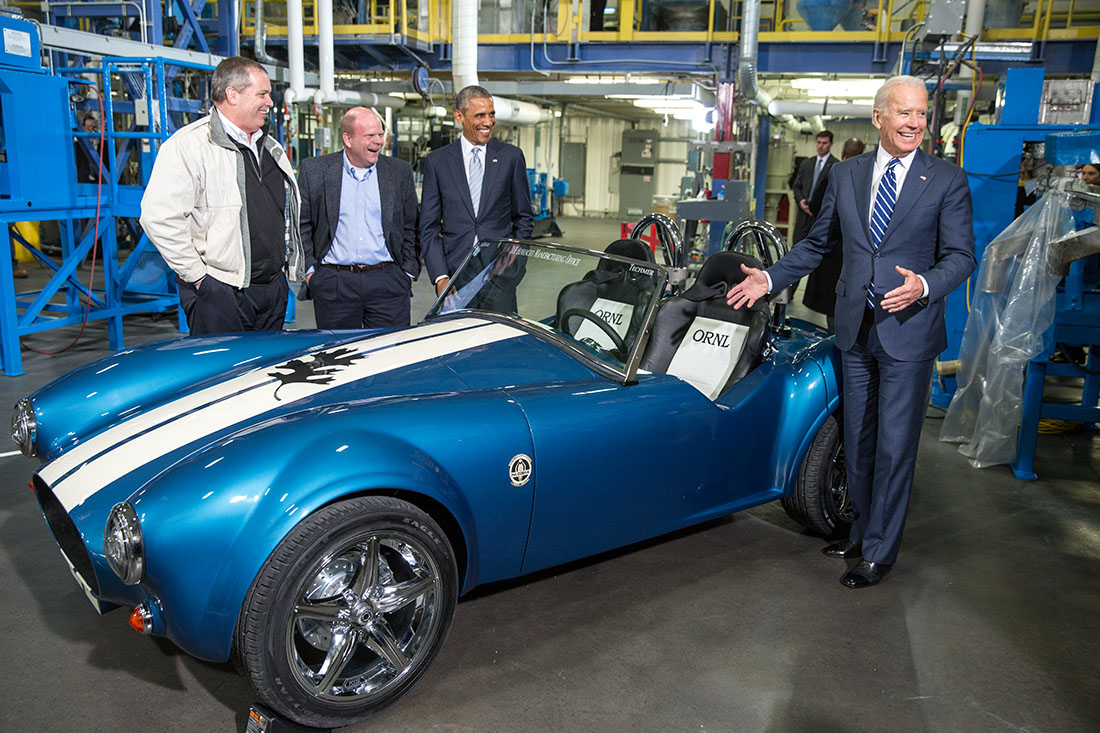
The 3D printing revolution will completely change the face of the car industry in the next two to five years, according to one of the experts speaking at a free QUT forum on design laws and 3D printing this Wednesday (August 30).
QUT Faculty of Law's Intellectual Property and Innovation Law Research Program is hosting the public symposium to look at the disruption and opportunities surrounding 3D printing.
Guest speakers will include Dr Brett Dale, the CEO of the Motor Trades Association of Queensland, who believes change is coming much faster than most people think.

- Above: Former US President Barack Obama and Vice President Joe Biden view a 3D printed carbon fiber Shelby Cobra car. (Official White House Photo by Pete Souza)
- Read about the world's first 3D printed self-driving shuttle, printed by Local Motors in the US earlier this year.
- Below: A video on the world's first printed car, the Local Motors Strati roadster, showing its origins, how it was manufactured and a test drive.
"Latest developments suggest that 3D printing is preparing to turn manufacturing on its head, with 3D metal printing systems that are much faster, safer and cheaper than existing systems and now capable of competing with traditional mass manufacturing processes," Dr Dale said.
"The hype is real with new technology enabling 3D printing up to 100 times faster, with 10 times cheaper initial costs and 20 times cheaper materials costs than existing laser technologies, which may be the tipping point for large scale 3D manufacturing of car components.
"The entire automotive value chain will be transformed by emerging technologies, such as 3D printing in two to five years. Specifically, 3D printing will disrupt our parts suppliers, our vehicle body sector, tools and servicing and eventually the car manufacturing sector itself.
"Industry must maintain the leadership and momentum on digital disruption and emerging technologies, which according to experts will impact business by 2020 with the major rollout and effect here by 2022. In the context of a timeframe, it is closer than many realise!"
QUT Faculty of Law's Professor Matthew Rimmer said the symposium speakers would delve into the legal, commercial and cultural issues surrounding 3D printing.
"The 3D printing revolution would transform the creative industries, design, fashion, manufacturing, and industry," he said.
"3D printing poses challenges for intellectual property (IP) in terms of the boundaries between copyright and design protection. There will be issues in respect of IP infringement and 3D printing. There have been significant intermediary liability issues for sites such as Thingiverse and Shapeways.
“There is also potential in terms of licensing new creations and inventions arising out of 3D Printing. There will also be scope for creative use and remixing of 3D printed designs – with the help of open licensing and the Creative Commons framework.
"This research symposium will feature members of our Intellectual Property and Innovation Law Research Program and their invited speakers who will consider the intellectual property implications for registered design owners, and those who use these technologies."
The speakers and their topics are:
Keynote speaker, Mitchell Adams, Manager for the Centre for Transformative Innovation at Swinburne University of Technology, will consider the effectiveness of Australian registered design rights with the advent of 3D scanners and printers.
Professor Margaret Petty, head of the School of Design at QUT's Creative Industries Faculty, will discuss how allied design disciplines need to consider what design means in the fourth industrial revolution, where it adds value, and how it can adapt to radically different forms of manufacture, supply chains, IP protections and customer demands for greater levels of customisation.
Daniel Flood, Creative Managaer at The Edge, State Library Queensland, will explore the understanding and misconceptions in the community around IP and 3D printing, and the role spaces such as libraries, public makerspaces, etc, can and do play in informing this conversation in the community.
Dr Brett Dale, CEO of the Motor Traders Association of Queensland, believes collaboration with stakeholders and regulators about emerging technologies to ensure that associated regulations are responsive, flexible and support business prosperity and consumer expectations will be essential as the automotive value chain will be transformed by emerging technologies within the next two to five years.
Dr Angela Daly, Vice Chancellor’s Research Fellow in QUT’s Faculty of Law will examine how a different linguistic, political and cultural context in China has given rise to a different 3DP ecosystem to the western world. Even so, similar concerns are arising regarding the relationship between 3D printing, design files and IP.
Professor Matthew Rimmer, leader of the IP and Innovation Law Research Program at QUT's Faculty of Law will analyse a recent decision by the US Supreme Court in the potential ramifications of the ruling for copyright law, designs, fashion and 3D printing.
The Third Industrial Revolution: Designs Law and 3D Printing will run from 1pm to 3pm on Wednesday, August 30, at QUT's Gardens Point campus in the Brisbane CBD.
The forum is free but visitors should register before attending.
For more details visit the event page or email law.research@qut.edu.au.
Media contacts:
- Mechelle McMahon, QUT media officer, media@qut.edu.au
- Rose Trapnell, QUT media team leader, 0407 585 901


